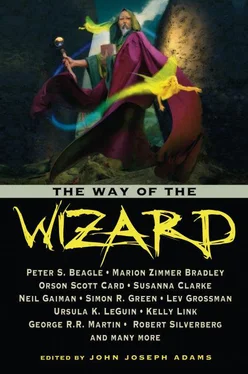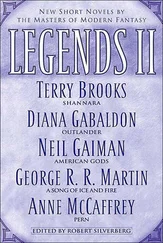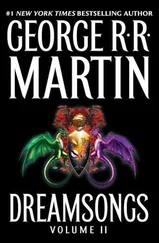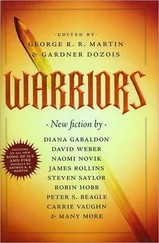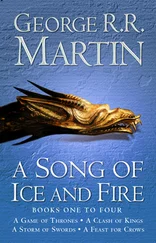A cloud drifted from where the Mirror had hung over the wreckage-strewn shelves, searching. On the floor beside Audra’s trunk, the lid torn off in the storm, it seemed to find what it was looking for. It slipped between the pages of a blue cloth-bound volume and disappeared.
“Here!” Audra said, clutching the volume to her chest. He scrambled toward her until they kneeled together in the middle of the floor, face to face.
Smoke curled out of the pages, only a wisp at first. Then more, green and glowing like a sunbeam in a mossy pond, crept out and wrapped itself around both them.
“The Guide you sought was always here,” a voice whispered. “Your captive, Emil, and your friend, Aurora.” Audra — Aurora — looked at the man she had hated and saw what was there all along: her Emil, thirty years since he had disappeared, with bald head and graying beard. Miles, who kept her because she looked like his lost love, but who wouldn’t touch her, in faith to his beloved.
Emil looked back at her, tears in the eyes that had seemed so dead and without hope until now.
“Now, Emil, speak the words,” the voice said, “and we will go home.”
So should you happen across a blue cloth-bound book, the sixth in a set of twelve, do not look for “The Magician and the Maid,” because it is not there.
Read the other stories, though, and in the story of the fairy who brought the waterfall to the mountain, you may find that she has a friend called Audra, though you will know the truth: it is not her real name.
If you read further you may find Emil as well, for though he never did become the King’s magician, every story needs a little magic.
According to Locus Magazine , Mike Resnickhas won more awards for short fiction than any other science fiction writer, living or dead. He is perhaps best known for his critically-acclaimed Kirinyaga series of short stories, but is also the author of more than fifty novels. In addition to his work as a writer, Resnick has also edited dozens of anthologies and served as executive editor for the online magazine Jim Baen’s Universe . Recent work includes a new collection, Blasphemy , just out from Golden Gryphon, and a new novel, The Buntline Special , from Pyr, due in December. Also, earlier this year, a nonfiction book, The Business of Science Fiction (written with Barry Malzberg), was released. Learn more at mikeresnick.com.
Perhaps the most famous wizard of them all is Merlin the magician, a staple of Arthurian legend. The character goes all the way back to Geoffrey of Monmouth in the twelfth century, and the story has been embellished over the years by numerous other authors, such as Thomas Malory ( Le Morte d’Arthur ), T. H. White ( The Once and Future King ), and Mary Stewart ( The Crystal Cave ). Though there are many variations, Merlin is generally remembered as having been sired by an incubus (a demon), which gave him supernatural powers. He tutored Arthur and helped him become king, and was eventually imprisoned in a crystal cave by the Lady of the Lake.
“I wrote this story the day I learned that my late mother-in-law had Alzheimer’s,” Resnick says. “I tried to imagine what it was like for her, going to bed each night and knowing she’d wake up a little less intelligent each morning. I knew I needed to work it out fictionally. Then I remembered that the Merlin of The Once and Future King , my favorite fantasy novel, lived backward in time, and I decided I could use that as a metaphor.”
Winter Solstice
Mike Resnick
It is not easy to live backwards in time, even when you are Merlin the Magnificent. You would think it would be otherwise, that you would remember all the wonders of the future, but those memories grow dim and fade more quickly than you might suppose. I know that Galahad will win his duel tomorrow, but already the name of his son has left me. In fact, does he even have a son? Will he live long enough to pass on his noble blood? I think perhaps he may, I think that I have held his grandchild upon my knee, but I am not sure. It is all slipping away from me.
Once I knew all the secrets of the universe. With no more than a thought I could bring Time to a stop, reverse it in its course, twist it around my finger like a piece of string. By force of will alone I could pass among the stars and the galaxies. I could create life out of nothingness, and turn living, breathing worlds into dust.
Time passed — though not the way it passes for you — and I could no longer do these things. But I could isolate a DNA molecule and perform microsurgery on it, and I could produce the equations that allowed us to traverse the wormholes in space, and I could plot the orbit of an electron.
Still more time slipped away, and although these gifts deserted me, I could create penicillin out of bread mold, and comprehend both the General and Special Theories of Relativity, and I could fly between the continents.
But all that has gone, and I remember it as one remembers a dream, on those occasions I can remember it at all. There was — there someday will be, there may come to you — a disease of the aged, in which you lose portions of your mind, pieces of your past, thoughts you’ve thought and feelings you’ve felt, until all that’s left is the primal id , screaming silently for warmth and nourishment. You see parts of yourself vanishing, you try to pull them back from oblivion, you fail, and all the while you realize what is happening to you until even that perception, that realization, is lost. I will weep for you in another millennium, but now your lost faces fade from my memory, your desperation recedes from the stage of my mind, and soon I will remember nothing of you. Everything is drifting away on the wind, eluding my frantic efforts to clutch it and bring it back to me.
I am writing this down so that someday someone — possibly even you —will read it and will know that I was a good and moral man, that I did my best under circumstances that a more compassionate God might not have forced upon me, that even as events and places slipped away from me, I did not shirk my duties, I served my people as best I could.
They come to me, my people, and they say, It hurts, Merlin. They say, Cast a spell and make the pain go away. They say, My baby burns with fever, and my milk has dried up. Do something, Merlin, they say; you are the greatest wizard in the kingdom, the greatest wizard who has ever lived. Surely you can do something.
Even Arthur seeks me out. The war goes badly, he confides to me; the heathen fight against baptism, the knights have fallen to battling amongst themselves, he distrusts his queen. He reminds me that I am his personal wizard, that I am his most trusted friend, that it was I who taught him the secret of Excalibur (but that was many years ago, and of course I know nothing of it yet). I look at him thoughtfully, and though I know an Arthur who is bent with age and beaten down by the caprices of Fate, an Arthur who has lost his Guinevere and his Round Table and all his dreams of Camelot, I can summon no compassion, no sympathy for this young man who is speaking to me. He is a stranger, as he will be yesterday, as he will be last week.
An old woman comes to see me in the early afternoon. Her arm is torn and miscolored, the stench of it makes my eyes water, the flies are thick around her.
I cannot stand the pain any longer, Merlin, she weeps. It is like childbirth, but it does not go away. You are my only hope, Merlin. Cast your mystic spell, charge me what you will, but make the pain cease.
I look at her arm, where the badger has ripped it with his claws, and I want to turn my head away and retch. I finally force myself to examine it. I have a sense that I need something, I am not sure what, something to attach to the front of my face, or if not my whole face then at least across my nose and mouth, but I cannot recall what it is.
Читать дальше
